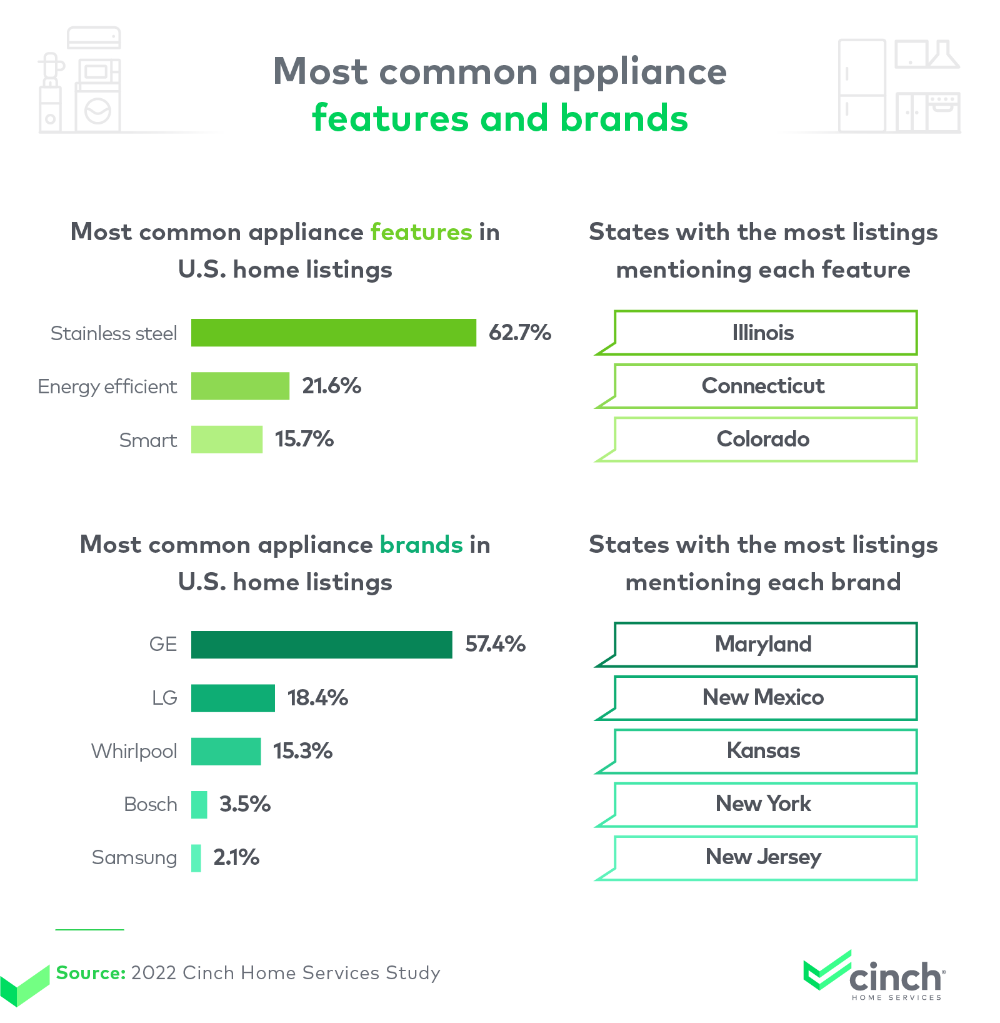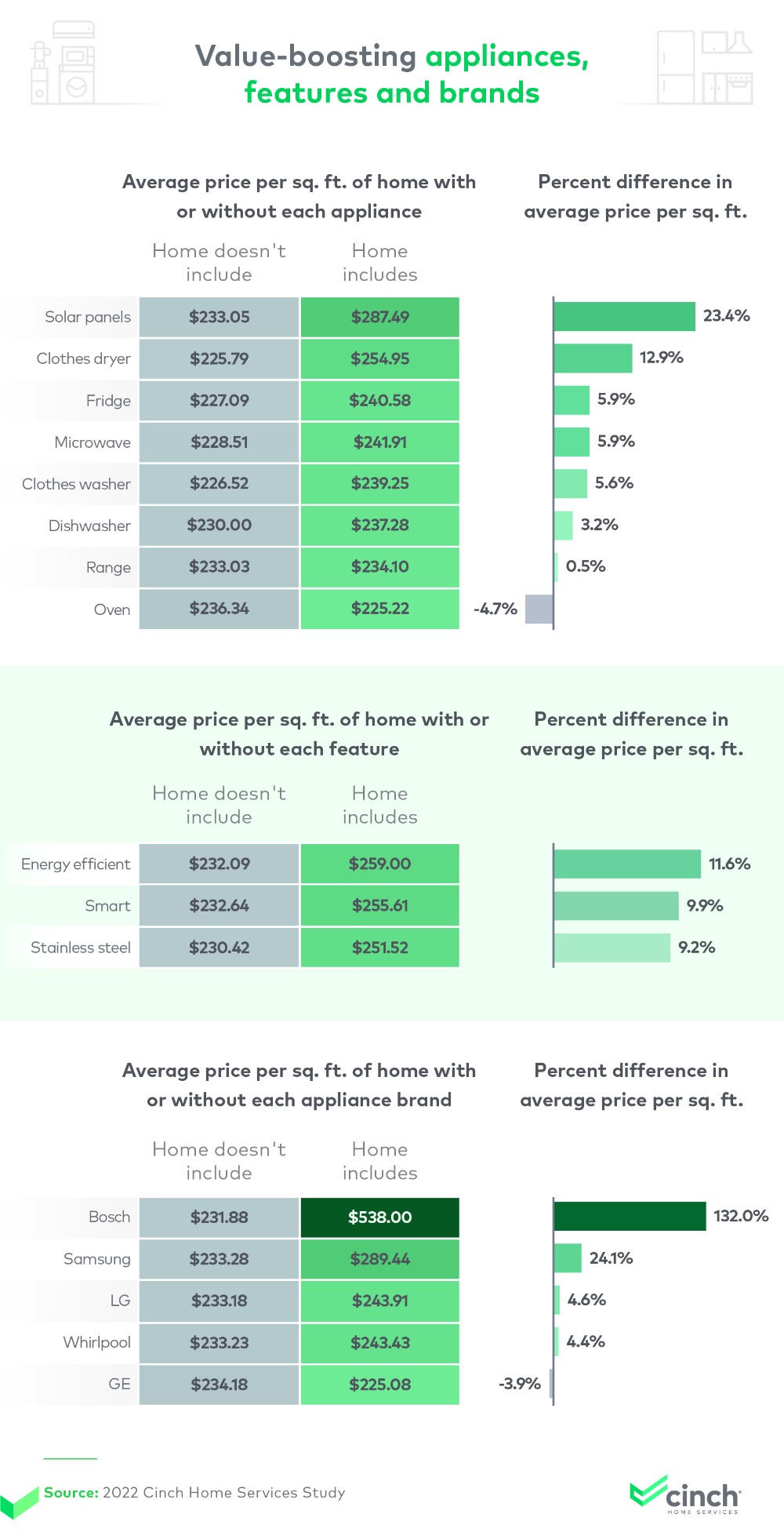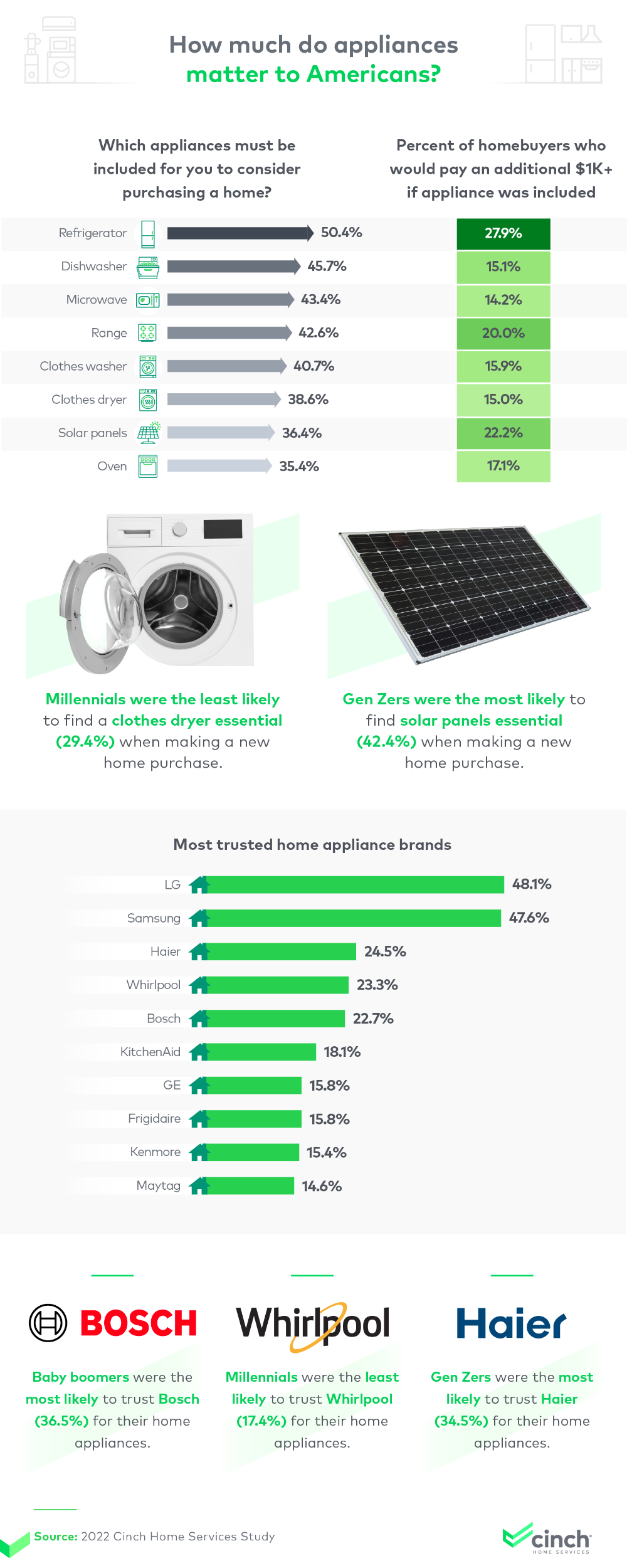Which home appliance upgrades boost property values the most?

Key takeaways:
- Connecticut, Massachusetts, Minnesota, Wisconsin and Washington include more appliance information in their home listings than other U.S. states.
- GE is the appliance brand most commonly mentioned in U.S. home listings (57.4%), and Maryland has the highest percentage of homes listed with GE appliances.
- Solar panels, clothes dryers and Bosch appliances boost home values the most.
- Refrigerators, dishwashers and microwaves are the appliances most Americans look for in a home.
- LG (48.1%) and Samsung (47.6%) are Americans’ most trusted home appliance brands.
The importance of appliances when selling a home
Many features attract buyers to a potential home, like location, curb appeal, hardwood floors, kitchen upgrades and new appliances. Appliances are an easy investment that sellers can make to improve the value of their home and increase its appeal to buyers.
To find out which appliances are most attractive to homebuyers, we analyzed property sale listings across all 50 states and surveyed 1,023 Americans about their appliance preferences when buying a home. Which appliances make your home a hot commodity on the market? Let's find out.
Appliances included
Appliances can improve the sellability of a home, so it's important to have details about them in property listings. Which appliances do sellers most often include, and which points do they tend to highlight?

When creating home listings, sellers mention washing machines (49.6%), dishwashers (43%) and refrigerators (42.7%) most often. These items likely see more use than most other appliances, and they're far more expensive than a microwave, so it's no wonder sellers want to point them out to potential buyers.
Environmentalist features, however, were rarer; only 0.7% of home listings mentioned solar panels. Most of them were in Hawaii and Arizona, where there's plenty of sunshine to harness for energy. But as eco-conscious improvements like solar panels gain popularity and the federal government continues to offer tax credits for them, we may see more of these types of appliances in future home listings.
Whatever the appliance, there was a marked difference in how they appeared in home listings in each state. Connecticut, Massachusetts, Minnesota, Wisconsin and Washington included the most appliance-related information in their home listings. On the other hand, Montana, Missouri, New York, California and Rhode Island had very little appliance information.

Some specific appliance features are worth noting, especially if they're visually attractive or made by a top brand. Sellers mentioned stainless steel in 62.7% of listings (especially in Illinois), and 57.4% noted the brand GE (most commonly in Maryland).
Most value-boosting appliances
Appliance information and details are important for property listings, but not all appliances are equal in the eyes of buyers. Which appliances and brands add the most monetary value to a home?

Although solar panels were among the least-mentioned appliances in property listings, they added the most value to homes, increasing the average price per square foot by 23.4%. Clothes dryers were the second-most value-producing appliance when selling a home, increasing prices by 12.9% per square foot.
The top three appliances in seller listings — washing machines, dishwashers and refrigerators — only increased home prices by up to 5.9% per square foot. With this in mind, sellers may want to rethink which appliances they feature in their listings.
As for specific features, energy-efficient appliances added the most value to the home at 11.6% per square foot. But while stainless steel was the most mentioned feature in listings, it only increased home value by 9.2% per square foot. Smart appliances, on the other hand, fetched a larger price increase of 9.9%. Some features might increase a home's value more than others, but it won't hurt to mention all three of these if your home has them.
Regarding brands, Bosch appliances increased home value per square foot by an astounding 132%. Samsung, the second-highest value-adding brand, only increased value by 24.1% per square foot. And surprisingly, even though GE was the brand mentioned most home in listings, doing so coincided with a reduced home price (-3.9%). It might be best to choose appliance brands that help your listing stand out in the crowd.
Americans' must-have appliances
Now that we know how appliances affect home values, how do they affect their desirability? Which appliances do buyers consider essential when buying a home, and which brands do buyers trust the most?

Over half of new homebuyers considered a refrigerator essential in a home, and 27.9% would pay an extra $1,000 or more for a home with a fridge. It's easy to see why, considering the expense of adding one. Dishwashers (45.7%), microwaves (43.4%) and ranges (42.6%) were other top buyer essentials.
Although the most value-increasing appliance, only 36.4% of buyers considered solar panels essential. Most of them were our youngest respondents — 42.4% of Gen Z expressed this preference, suggesting that solar panels may become more significant in future home sales. Still, 22.2% of buyers said they would currently pay an additional $1,000 or more for a home with solar panels, so there are many reasons to consider adding them.
With so many brands to choose from, people often tend to favor some in particular based on their reputation. LG (48.1%) and Samsung (47.6%) were the ones most trusted by Americans for home appliances. On the other hand, Bosch — the brand that added the most value to homes — was trusted most by just 22.7% of Americans, most of whom were baby boomers.
Appliances attract
Of the many improvements homeowners can make before selling a home, upgrading appliances is a simple and relatively inexpensive option that can have significant results. Investing in environmentally friendly solar panels will add the most value to a home, while refrigerators and dishwashers will likely appeal to the most buyers — especially if they're made by LG or Samsung. Whichever appliance upgrades you choose, remember to properly advertise them in your home's listing so it stands out from the rest.
Methodology
For this study, we gathered for-sale property listings data across all 50 states. More specifically, we pulled 10 listings from 50 of the most populated ZIP codes within each state. Each property's description and metadata were text-analyzed to determine property list price, size and appliance inclusions. In total, 24,558 properties were analyzed.
Additionally, we surveyed 1,023 Americans about their thoughts on appliance inclusion when purchasing a new home. Of the respondents, 21.4% were baby boomers, 26.6% were Gen X, 26.2% were millennials and 25.8% were Gen Z.
About Cinch Home Services
With more than 40 years of home industry experience, Cinch Home Services offers award-winning home warranty services in America's 48 contiguous states. Cinch has a range of plans to fit your needs, a nationwide network of service pros to ensure your repairs get done right, and an industry-leading 180-day workmanship guarantee to back it all up.
Fair use statement
Do you know someone preparing to put their home on the market? Feel free to share this article with anyone you'd like. We just ask that you do so for noncommercial purposes only and provide a link to this page to give the authors their due credit.
